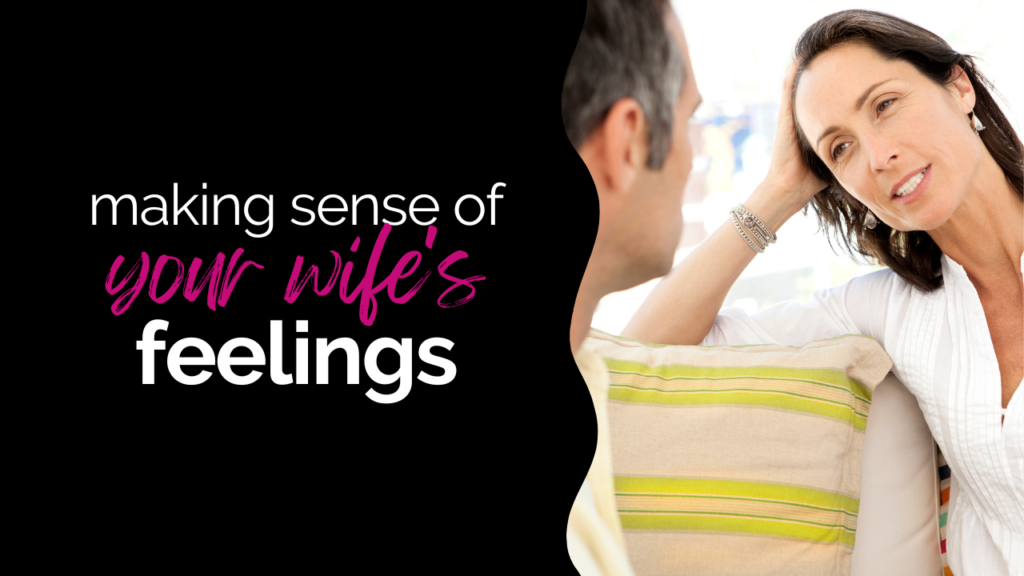
You might be confused by just how emotional your wife can get. She seems to feel every possible emotion and want to talk about them all. Why is that? What does it mean? And what can you do? The solutions are usually simple, but not always easy or obvious.
The truth is women don’t feel more than men do. In fact, research suggests than men are more emotionally sensitive than women. Shocker, eh?
Therefore, the big difference is not in the experience of emotions, but in the expression of them. Boys and men tend to take action, whereas girls and women use the opportunity to make connections with others.
Even very young boys tend to be very empathic.
When they see someone in distress, they are more likely than girls to offer comfort and assistance. Girls notice and may offer words of encouragement, depending on the situation. However, young boys tend to offer comforting words and touch, even hugs. Sometimes they’re just affectionate for affection’s sake. My 8-year-old grandson certainly is. On a recent visit, he often just came over and put his arms around me.
So what happened?
By the time they enter kindergarten, most boys have been shamed when they express their own vulnerability. So much so that they have learned to hide it. When boys see other boys crying, they tend to pull back or pretend that nothing is wrong. Every boy has already learned that part of the Boy Code. If he hasn’t, he can expect more shaming until he’s learned to hide better.
In short, boys are taught to avoid their emotions.
No one does this better than military training. In fact, research suggests that being in combat does not make a soldier suicidal. He gives up because he is not allowed to talk about what happened and to receive support as he processes his trauma and grief. It’s more than his tender heart can handle.
Yes, the Veterans Administration makes treatment available to these men. But the shame of admitting he’s struggling is more powerful than the VA seems to realize. So he keeps marching as long as he can, often using drugs and/or alcohol to numb out.
In contrast, girls are taught to express their emotions.
We share our feelings by telling emotional stories. We bond with one another as well tell our best friend our deepest secret.
You might assume that’s a good thing. However, the process – the script we’ve been taught to use – tends to make us more dependent than resilient. Why is that?
When we’re having a bad day, women tend to toss our emotions out into the space around us. Another female (girl or woman) picks up those feelings and repackages them for us. If we’re really stressed, we repeat the process over and over until we finally feel better. That is, the pain has subsided. In the end, we don’t usually know anything more about who we are or how to set boundaries or protect ourselves. We just have empathy. Which makes us feel better. Not a very good strategy in the long run. Especially if we try to use that script with a husband.
You find it fruitless and exhausting.
You hate to see your wife in distress, so you step in as quickly as your can to solve the problem. Often before you even understand what the real problem is. Remember, she learned to talk in paragraphs, so it’ll be hard for you to get to the bottom line.
So if your wife has been trained to express her emotions until she feels better, what can you do … short of learning to respond like a woman? Which I do not recommend!
You choose the role you will play.
- A victim avoids. He moves away from a challenge.
- A villain attacks. He moves against a challenge.
- A hero acts. He moves toward a challenge.
You ignore her.
Go silent. Walk away. Leave the house. She’ll feel abandoned and alone. The best you get is the silence. Until next time. So you complain to your friend. It’s happening at his house, too.
If this is your approach, you are the victim in the story.
You get angry with her.
Tell her you’re sick and tired of hearing it. Put her down. She’ll stop talking to you and listening to you. But you know you’re right.
If this is your approach, you are the villain in the story.
You step into the space with her.
Ask her if she wants your help with something or if she just wants to share with you. If she has a problem to be solved, make sure you can clearly define the problem before you try to solve it. Slow her down so you can recap the issue and ask if you’ve got it right. Then ask her what she thinks she should do before you offer your solution. She might already know what she needs to do.
If she just want to share, look into her eyes with great affection while she talks. Summarize as she goes along so she knows you’re listening. Make physical contact. Touch her hand, her knee, her face. Hold her if the occasion calls for it. Allow yourself to guide her along in the rhythm of her emotional song. You can do this. You were created for this. Enjoy the fact that she want to share her heart with you. And like any good dancer, you’ll find the space to walk with her off the dance floor.
If this is your approach, you are the hero in the story.
And there you have it. I hope my explanation makes sense. If you’d like clarification, let me know. I’m here to help.

